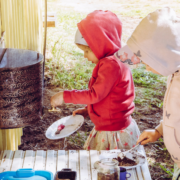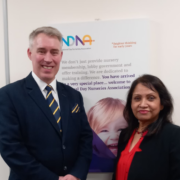NDNA News
of 6
Government publishes its strategy “Giving every child the best start in life”
Following a string of announcements since Friday and over the weekend, the Department for Educati…
Read more 
Government announces plans for 1,000 Best Start Family Hubs
Parents across the country have been promised more support to make family life easier as the gove…
Read more 
Two hundred new school-based nurseries will create 4,000 places
The Government has announced that almost 200 new school-based nurseries will open in September de…
Read more 
Growth in PVI nurseries but a drop in childminders – latest Ofsted statistics
The latest ofsted statistics shows there has been growth in PVI nurseries but a drop in childmind…
Read more 
Ofsted announces plan to strengthen inspections through new team structures
Following feedback from last year’s Big Listen and the recent consultation on inspection reform, …
Read more 
Sarah Steel former NDNA Chair of Trustees honoured with OBE
Sarah Steel former NDNA Chair of Trustees honoured with OBE
Read more 
Ofsted inspections will be confirmed in September
Ofsted inspections will be confirmed in September
Read more 
Chancellor’s spending review plans for the future, but sector needs investment now
Chancellor’s spending review plans for the future, but sector needs investment now
Read more 
Consultation on amending the indoor space requirements in the EYFS
Consultation on amending the indoor space requirements in the EYFS
Read more 

NDNA comments on BBC programme How Safe Are Our Nurseries?
NDNA comments on BBC programme How Safe Are Our Nurseries?
Read more 
Government approves grants for 300 school-based nurseries
Government approves grants for 300 school-based nurseries
Read more 
Take nurseries out of unfunded NIC increases – sign the petition
Take nurseries out of unfunded NIC increases – sign the petition
Read more 
NICs debated in Parliament: “different treatment” for maintained nurseries highlighted
The Department for Education has published how it will deliver £25 million of additional funding …
Read more 
Coram report: cost of childcare increasing in Wales and Scotland but halved in England
Coram report: cost of childcare increasing in Wales and Scotland but halved in England
Read more 
IPPR report on collective bargaining highlights childcare
IPPR report on collective bargaining highlights childcare
Read more 
Private day nurseries eligible for claiming Employment Allowance at increased rate
Private day nurseries eligible for claiming Employment Allowance at increased rate
Read more 
Call on government to support new definition of ‘school readiness’
Call on government to support new definition of ‘school readiness’
Read more 
Council votes against the removal of 150 places from PVI sector
Council votes against the removal of 150 places from PVI sector
Read more 
New charges guidance to “cut costs for parents”
The Government has put out new ‘Statutory guidance for local authorities on the provision of earl…
Read more 
Funding rate for Wales for three and four year olds to increase to £6.40
The Welsh Government has announced today that the funding rate for three and four-year-olds acros…
Read more 
New incoming Chief Executive for NDNA
Find out more about the new incoming Chief Executive for NDNA Tim McLachlan as Purnima Tanuku CBE…
Read more 
Ofsted launches public consultation on education inspections
Ofsted launches public consultation on education inspections
Read more 
Nursery owners recognised in New Year Honours List
Nursery owners recognised in New Year Honours List
Read more 
MPs spoke about nursery issues in National Insurance Contributions debate
MPs spoke about nursery issues in National Insurance Contributions debate
Read more 
Latest provider statistics show PVI sector crucial to expansion
Latest provider statistics show PVI sector crucial to expansion
Read more 
Wales funding rates revealed but 20% increase will not cover all costs
Wales funding rates revealed but 20% increase will not cover all costs
Read more 
England funding rates 2025-26: won’t factor in National Insurance Contributions
England funding rates 2025-26: won’t factor in National Insurance Contributions
Read more 
Scottish Budget – funding to continue childcare support for priority families
Scottish Budget – funding to continue childcare support for priority families
Read more 
EYFS profile results: Children making steady progress
EYFS profile results: Children making steady progress
Read more 
MPs debate the impact of NICs changes on employers
MPs debate the impact of NICs changes on employers
Read more 
DfE research reveals funding to early years providers is insufficient
DfE research reveals funding to early years providers is insufficient
Read more 

